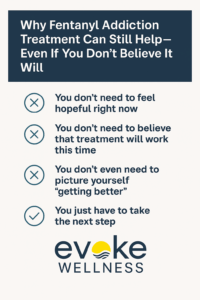You don’t need to feel hopeful right now.
You don’t need to believe that treatment will work this time.
You don’t even need to picture yourself “getting better.”
You just have to be willing to take the next step.
That’s not motivational fluff. It’s survival advice—for people who’ve been through treatment before and came out feeling more lost than found. For people who’ve relapsed, questioned everything, and wondered if there’s even a point in trying again.
Especially with fentanyl—where the stakes are high and the relapses can hit hard—it’s easy to feel like another round of treatment is just more of the same. But what if relapse isn’t a failure?
What if it’s a diagnostic?
When Treatment Doesn’t Feel Like It Worked
You showed up. You did the detox. Maybe you even stayed sober for a while. And then?
Then the pull of fentanyl got louder again. Or maybe it never really left.
You might have left treatment feeling foggy, unfinished, or like the progress you made wasn’t enough to hold you. That’s real. And it doesn’t mean you failed.
What it means is simple: the structure around you wasn’t strong enough yet. And that can be changed.
You don’t need to trust the system. You don’t need to be convinced. You just need to know this: relapse doesn’t erase everything. It reveals what was missing.
Relapse as a Blueprint, Not a Backslide
In medicine, if a treatment plan doesn’t work, we revise it. We look at symptoms, responses, timelines. We don’t accuse the patient of failing—we shift the approach.
Addiction deserves the same dignity.
If fentanyl addiction treatment didn’t stick the first time, you’re not out of options. You’re just more informed.
- What triggered you post-discharge?
- Where did support fall off?
- Were there gaps in trauma care, mental health treatment, or community?
- Did the intensity or duration of the program match your needs?
Every relapse holds this information. That doesn’t make it good—but it does make it useful.
You Don’t Have to Believe This Time Will Be Different
Let’s set hope down for a second.
Hope can be too heavy when you’re in a place of deep doubt. You’ve tried. You’ve slipped. You’ve gotten your hopes up and watched them fall flat. So if you’re numb or cynical right now, it makes perfect sense.
Here’s what matters more than hope: movement.
Take the step anyway. Make the call anyway. Show up anyway.
Even if you think nothing will change.
Why? Because treatment is often cumulative. The first time teaches you how to detox. The second time teaches you how to rebuild. The third might be where it all clicks.
Some people get it on the first try. Most don’t.
That’s not because you’re broken. It’s because recovery is rarely linear—and fentanyl addiction is complex, fast-acting, and deadly. It rewires pain, memory, and motivation. Beating it takes more than one try. Sometimes more than five.
That’s normal. It’s not a reason to quit.
You Deserve Treatment That Meets You Where You Are
If the treatment you received before felt mismatched, rushed, or shallow, that’s valid.
Effective treatment for fentanyl addiction isn’t one-size-fits-all. It needs to account for:
- How long and how heavily you were using
- Co-occurring mental health conditions
- Medical risks or chronic pain issues
- Personal history, trauma, or stress load
- What’s realistic in your daily life—kids, job, transportation
At Evoke Wellness in Cohasset, we design fentanyl addiction treatment around your reality—not a generic recovery script.
We won’t ask you to pretend to feel hopeful. We’ll just ask you to walk in the door.
The Truth Most People Don’t Say: Everyone Struggles
It’s time we stopped treating relapse like the unspoken shame of recovery.
You are not alone in struggling. You are not weak for not getting it right away.
The reality is, most people who succeed in long-term recovery have relapsed at some point. It’s not the relapse that defines you—it’s what you do after.
You don’t have to call it a “fresh start.”
You don’t have to believe in yourself just yet.
But you do have to show up. And we’ll meet you there—with support, structure, and zero judgment.
Why Cohasset, MA Matters
If you’re local to Massachusetts, especially the South Shore or Greater Boston area, you already know: the fentanyl crisis here isn’t slowing down.
That’s why having access to local, fentanyl-specific treatment matters. It means:
- You don’t have to travel far to get help
- Your care team understands the local landscape
- You can build support in your real-life environment
At Evoke Wellness at Cohasset, our fentanyl addiction treatment services are tailored to this community—designed for real lives and real recovery paths.
We’ve seen clients return after relapsing. And we’ve seen those second (or third) stays stick in ways the first one didn’t.
Real Talk from a Peer
“The first time, I was just trying to survive detox. The second time, I figured out what actually mattered. I hated that I had to go back… but I’m glad I did.”
– Former Client, 2023
FAQs: Fentanyl Addiction Treatment After Relapse
Does relapse mean treatment didn’t work?
Not necessarily. Relapse can mean that part of the care plan wasn’t a good fit—whether that’s the timing, the intensity, or the aftercare support. It’s data, not defeat.
Is it worth trying again if I feel hopeless?
Yes. Hope isn’t a prerequisite. Taking action despite doubt is often how hope returns. You don’t need to believe in the outcome to make the call.
What’s different about fentanyl addiction treatment?
Fentanyl is faster-acting and more potent than other opioids, which can make withdrawal, cravings, and relapse more intense. Treatment often needs to be longer, more structured, and more trauma-informed.
Can I come back to Evoke if I’ve been here before?
Absolutely. We welcome returning clients and treat them with respect, not shame. Many of our clients benefit most from their second stay.
How do I know if I need residential or outpatient care?
That depends on your recent use, medical needs, and daily life responsibilities. We offer both—and our team can help you figure out the right fit during an intake call.
Ready to take the next step—even if you’re not sure it will work?
You don’t have to feel certain. You just have to reach out.
Call 866-931-6429 or visit Contact Us to learn more about our fentanyl addiction treatment services in Cohasset, MA. Even if you’re skeptical, you’re welcome here.





